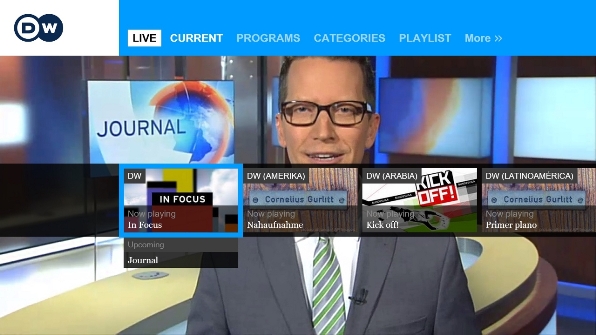Market roundup: March 2015
Latin America
Euromaxx has a new broadcasting partner in South America. The Colombian TV channel Cablenoticias will be broadcasting DW’s popular culture and lifestyle program in Spanish five days a week. The channel is carried by over 800 TV providers with a potential combined audience of 7.48 million households on two continents. Cablenoticias is available via broadcasting partners throughout Central America, the USA, Mexico and 8 South American countries.
Asia
Learning by Ear has a new broadcasting partner in Afghanistan. Radio Azad is now broadcasting the educational radio program in Dari and Pashto. The station, located in the northern province of Balkh, is Learning by Ear’s 16th partner in Afghanistan.
DW has a new broadcasting partner in Pakistan’s largest metropolis, Karachi. Star Cable Network is now broadcasting DW’s English TV channel to around 50,000 households.
Online
The DW Smart TV app is now available via the Sony Entertainment Network (SEN) on all Sony smart TV models produced after 2013. With Sony’s 15 percent market share in connected TVs, the partnership will deliver multilingual DW content live and on-demand to an expanded global audience. The DW Smart TV app is also set to be implemented on Android TV platforms in the future.
DW honors sacrifice in the name of free speech
Out of all the recent sacrifices made in the name of freedom of speech, the tribulations of the Saudi Arabian activist Raif Badawi poignantly exemplify the precarious condition of free speech in some parts of the world today. This year Badawi is the recipient of the first DW Freedom of Speech Award, which is being presented by DW in conjunction with “The Bobs- Best of Online Activism” awards.
Badawi was arrested in 2012 and charged with insulting Islam through electronic channels via his website, Free Saudi Liberals, which provided a public forum for social criticism in Saudi Arabia. In May 2014 Badawi was sentenced to 10 years in prison and 1,000 lashes to be carried out 50 at a time for 20 weeks. He was publically flogged 50 times in January. It is feared that he will die if subjected to the full extent of his sentence.
With this award, DW is actively taking part in the international protest against the treatment Badawi is receiving simply for publicizing his opinion. Amnesty International has started a campaign calling for his immediate release. On social media , supporters have gathered around the hashtag , #iamraif. A group of academics and social activists from the United States Commission on International Religious Freedom even offered to each take 100 of the lashes that would have been administered to Badawi rather than “stand by and watch him be cruelly tortured.”
Badawi will be regognized by DW at The Bobs awards ceremony during the 2015 Global Media Forum in Bonn on June 23.
Taking a new look at digital activism
For the past 11 years, The Bobs is where DW has honored the world’s most courageous, creative and compelling international online activists and bloggers.
The 2015 competition is kicking off with new categories that introduce a fresh focus on how digital activism is changing the world. The Bobs jury categories will now put the spotlight on the critical issues of privacy and security, arts and media and social change. Judges will determine how contestants have used their digital skills and activism to create positive impacts within these fields. The new format also allows for more than one contestant to stand out for their exemplary work.
How can a digital crusader improve economic development and living conditions? Who is producing the most innovative or avant-garde formats to speak out online? What is the most cutting-edge software for protecting data and digital privacy? On June 22 at the Global Media Forum in Bonn, we will all get the chance to find out.
The core values of the Bobs remain the same, even if they will now be presented more directly. Last year’s winner of best blog was the Egyptian photo blogger, Mosa’ab Elshamy, who showed courage combined with a brilliant eye for powerful imagery. His blog is an example of where fine art meets journalism. In 2013 the “grand prize” winner was the Chinese blogger Li Chengpeng, whose tireless efforts for freedom of speech made him a digital celebrity in China and a salient example of contemporary activism as well as a trendsetter for those living under oppression. No matter the year or the format, the Bobs have always looked for the bravest and the best.
If you are a blogger or online activist you can submit your website now. You have until March 12 to enter your submissions.
Smart content for smart TVs
The future of developing smart TV is caught between what audiences are used to and what the user experience can actually provide. Even the best models are held back by cumbersome Internet browsing with a television remote or poor user interface combined with an overwhelming number of applications that complicate entertainment choices.
But people consume information differently than they would entertainment. And a recent study suggests that news apps for smart TVs are among the most popular. Audiences want direct and clear access to broadcast news that isn’t constrained by the scheduling of linear television or made tiresome by typing into a web browser. Consumers are buying more smart TVs and even if they don’t use the device’s full potential, the apps which succeed are going to get enormous exposure.
DW is establishing its place alongside other top international news broadcasters on smart TVs with the continual development of user-friendly apps. The latest development is a deal making the DW for Smart TV app available on all Sony Smart TVs via the Sony entertainment network. Sony is among the top three manufacturers of smart TVs worldwide.
DW’s app unlocks the full potential of smart TV with an attractive layout and on-demand access to the best DW programming and world-class news broadcasting. DW’s multilingual and culturally-tailored content knows no borders and will reach high-end market users of this state-of-the-art entertainment technology.
There are also other options for converging the Internet with television. Set-top-boxes are an alternative to smart TVs for providing audiences with a connected entertainment experience. Some critics consider even them to be a more adaptable and superior alternative. DW is also available on Amazon Fire set-top-boxes via the Opera Store ,with on-demand content on any television with a Amazon fire box.The DW for Smart TV app is also available via a Google TV set-top-box.
The next step for DW is a planned rollout of the DW app for Android TV. The horizon for innovation stretches far and wide. In the future it is likely that every living room will eventually have a smart TV and DW will be right where the audience is looking.
News anchors away: Stewart, Williams and the news about the news
Brent Goff, DW News Main Anchor
This was not the way I planned to start the day. In fact, I got very little sleep last night after I heard the news. The news about the news. The news about what the news just lost — times two. In the span of less than an hour, the two most (still) trusted and recognized television news anchors in the United States announced that they are leaving.
When I heard the news alarm on my iPhone and read the headline “Most trusted journalist is hanging it up”, I immediately assumed this was the career benediction for NBC’s “misremember” main anchor, Brian Williams. But I was jolted out of my sleep when I realized the headline referred to the host of The Daily Show, Jon Stewart.
My instinct — to associate “most trusted journalist” with a major news operation such as NBC — was right and yet oh so wrong. Not immediately including a faux-news anchorman in my calculus of highest trust seemed normal, but it does not compute in the new normal.
And then it hit me: We journalists live and operate in two realities. One, in which we like to see ourselves. The other, in which the world perceives us. The two are disturbingly different.
NBC’s announcement that “Nightly News” Anchor Brian Williams will take a six-month leave without pay in the wake of “Misremember-Gate” received cynical eyebrow-raising reactions on social media. Six months? Is that long enough? What happens after six months? Will we forgive and forget and allow Williams to reassume his news throne?
When the flash came that Jon Stewart is leaving The Daily Show, it felt like a modern day version of “Sinners in the Hands of an Angry God”. A collective oh-no-say-it-ain’t-so rang out across social media. Twitter exploded with #JonStewart along with Internet prayers for Stewart to change his mind. 
Many people suggested, and not jokingly, that Stewart should replace Williams at NBC. It didn’t help that the New York Times reported that Brian Williams had shown serious interest in replacing late-night talk show host Jay Leno. One of the world’s most successful and recognized TV news anchors had considered leaving his prized perch to tell jokes and interview celebrities about their laugh lines. Who can blame the public for being cynical and reallocating their trust?
This crisis of trust knows no borders. In Germany, public television is criticized as a bloated bureaucratic store-house for editors who prefer comfort reporting and resist their duty to act as watchdogs of the government. Even the German version of The Daily Show has not escaped serious breaches of journalism, further adding to the public’s notion that reporters are more pseudo than real.
The television itself runs the risk of becoming traitor in the new normal. Thanks to reports that smart TV’s may have the ability to record our conversations and forward the information to third parties, consumers are being advised to monitor their chatter in front of the telly.
All of this contributes to an erosion of the trust journalists work everyday to earn. Traditional news authorities lose while unorthodox purveyors of common sense wrapped in satire win the day.
We can’t all be Jon Stewart. So what can journalists do to diminish this sad dichotomy?
Consider this: Before the revelations that he lied in his Iraq War reporting, Brian Williams ranked as the 23rd-most-respected person in the US and he drew the largest audience every evening (this, despite the new normal). His ranking is now at 835, putting him on par with cable television actors in series with titles such as “Duck Dynasty”.
The point is clear: Despite the massive failings of traditional journalists and the uptake in popularity of faux-news, the public continues to give us the benefit of the doubt. The decades of delivering strong, reliable journalism in Western Europe and North America have not been forgotten. Our journalism transgressions are still met with public redemption. But this won’t last forever. Our task is to recommit ourselves everyday to the age-old principles of solid journalism and credible news reporting, and to be courageous and bold in presenting our product as it is: the honorable quest of the truth.
Anyone who would trade that job for late-night talk is not worth losing sleep over.













Feedback